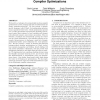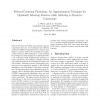459 search results - page 89 / 92 » Automated Learning of Rules Using Genetic Operators |
136
click to vote
PLDI
2003
ACM
15 years 7 months ago
2003
ACM
We describe a technique for automatically proving compiler optimizations sound, meaning that their transformations are always semantics-preserving. We first present a domainspeci...
143
click to vote
AINA
2010
IEEE
15 years 6 months ago
2010
IEEE
One of the major premises of P2P systems is to enable fully decentralized collaborative functionalities for supporting work teams and P2P communities. Within collaborative systems,...
112
click to vote
SPLC
2008
15 years 3 months ago
2008
Software Product-lines (SPLs) use modular software components that can be reconfigured into different variants for different requirements sets. Feature modeling is a common method...
130
click to vote
IFIP3
1998
15 years 3 months ago
1998
Development of a wide spread project intended to teaching Computer Science, integrating a considerable number of students all over a country with big geographical extension and sc...
152
Voted
KR
1992
Springer
15 years 6 months ago
1992
Springer
This paper studies a version of the job shop scheduling problem in which some operations have to be scheduled within non-relaxable time windows i.e. earliest latest possible start...


